Niklas Åkerblom
Tree Ensembles for Contextual Bandits
Feb 10, 2024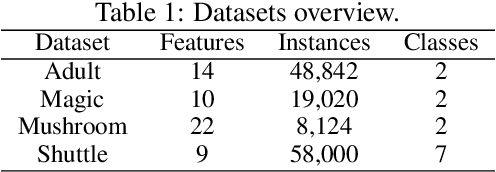
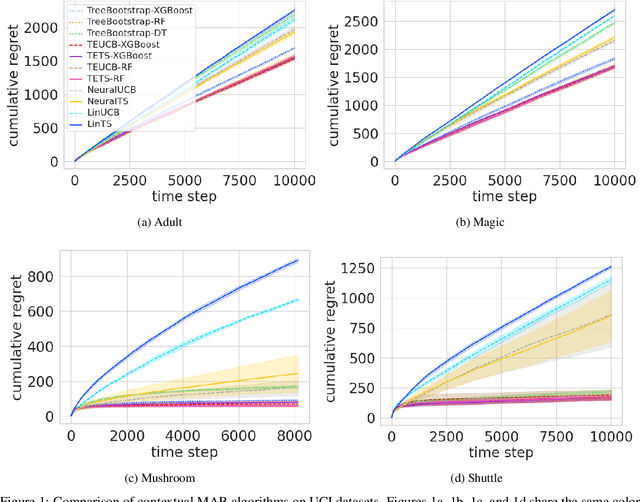
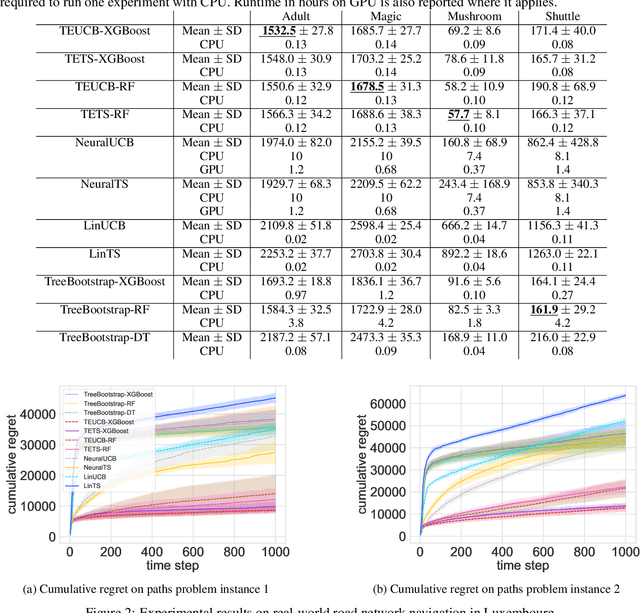
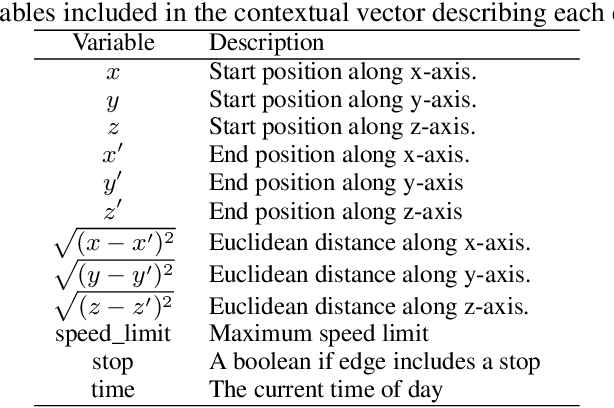
Abstract:We propose a novel framework for contextual multi-armed bandits based on tree ensembles. Our framework integrates two widely used bandit methods, Upper Confidence Bound and Thompson Sampling, for both standard and combinatorial settings. We demonstrate the effectiveness of our framework via several experimental studies, employing XGBoost, a popular tree ensemble method. Compared to state-of-the-art methods based on neural networks, our methods exhibit superior performance in terms of both regret minimization and computational runtime, when applied to benchmark datasets and the real-world application of navigation over road networks.
Combinatorial Gaussian Process Bandits in Bayesian Settings: Theory and Application for Energy-Efficient Navigation
Dec 20, 2023
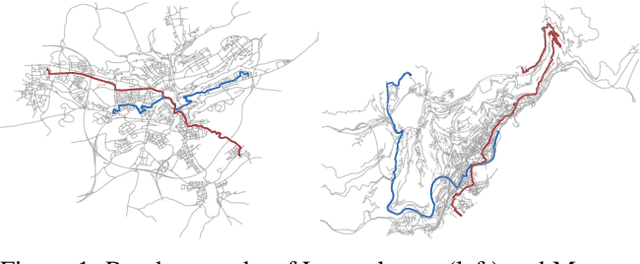

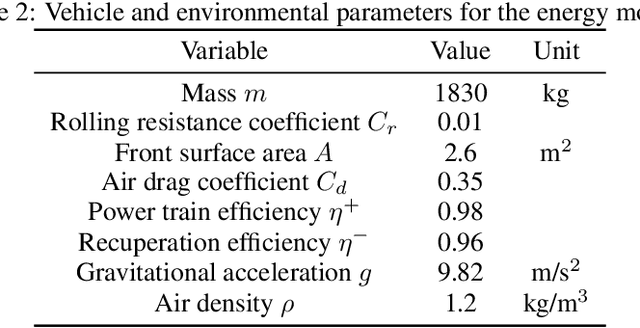
Abstract:We consider a combinatorial Gaussian process semi-bandit problem with time-varying arm availability. Each round, an agent is provided a set of available base arms and must select a subset of them to maximize the long-term cumulative reward. Assuming the expected rewards are sampled from a Gaussian process (GP) over the arm space, the agent can efficiently learn. We study the Bayesian setting and provide novel Bayesian regret bounds for three GP-based algorithms: GP-UCB, Bayes-GP-UCB and GP-TS. Our bounds extend previous results for GP-UCB and GP-TS to a combinatorial setting with varying arm availability and to the best of our knowledge, we provide the first Bayesian regret bound for Bayes-GP-UCB. Time-varying arm availability encompasses other widely considered bandit problems such as contextual bandits. We formulate the online energy-efficient navigation problem as a combinatorial and contextual bandit and provide a comprehensive experimental study on synthetic and real-world road networks with detailed simulations. The contextual GP model obtains lower regret and is less dependent on the informativeness of the prior compared to the non-contextual Bayesian inference model. In addition, Thompson sampling obtains lower regret than Bayes-UCB for both the contextual and non-contextual model.
Cost-Efficient Online Decision Making: A Combinatorial Multi-Armed Bandit Approach
Aug 21, 2023Abstract:Online decision making plays a crucial role in numerous real-world applications. In many scenarios, the decision is made based on performing a sequence of tests on the incoming data points. However, performing all tests can be expensive and is not always possible. In this paper, we provide a novel formulation of the online decision making problem based on combinatorial multi-armed bandits and take the cost of performing tests into account. Based on this formulation, we provide a new framework for cost-efficient online decision making which can utilize posterior sampling or BayesUCB for exploration. We provide a rigorous theoretical analysis for our framework and present various experimental results that demonstrate its applicability to real-world problems.
A Combinatorial Semi-Bandit Approach to Charging Station Selection for Electric Vehicles
Jan 17, 2023

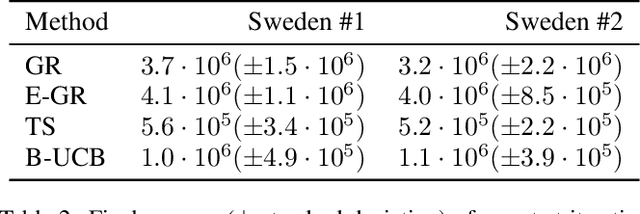
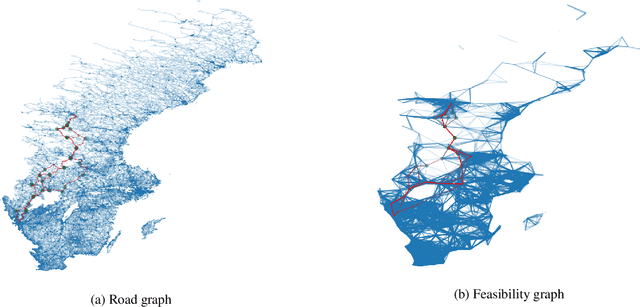
Abstract:In this work, we address the problem of long-distance navigation for battery electric vehicles (BEVs), where one or more charging sessions are required to reach the intended destination. We consider the availability and performance of the charging stations to be unknown and stochastic, and develop a combinatorial semi-bandit framework for exploring the road network to learn the parameters of the queue time and charging power distributions. Within this framework, we first outline a pre-processing for the road network graph to handle the constrained combinatorial optimization problem in an efficient way. Then, for the pre-processed graph, we use a Bayesian approach to model the stochastic edge weights, utilizing conjugate priors for the one-parameter exponential and two-parameter gamma distributions, the latter of which is novel to multi-armed bandit literature. Finally, we apply combinatorial versions of Thompson Sampling, BayesUCB and Epsilon-greedy to the problem. We demonstrate the performance of our framework on long-distance navigation problem instances in country-sized road networks, with simulation experiments in Norway, Sweden and Finland.
An Online Learning Approach for Vehicle Usage Prediction During COVID-19
Oct 28, 2022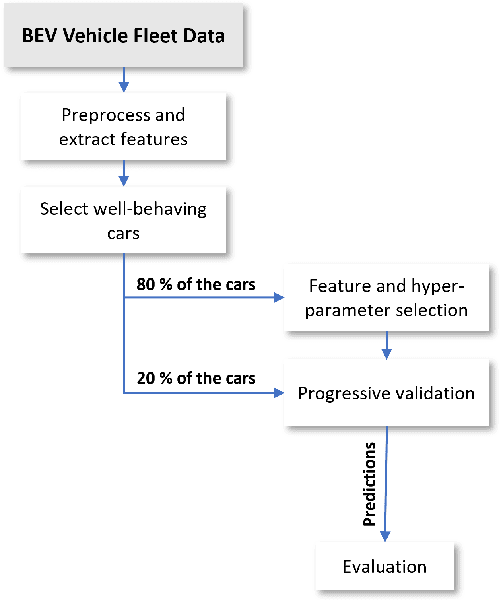
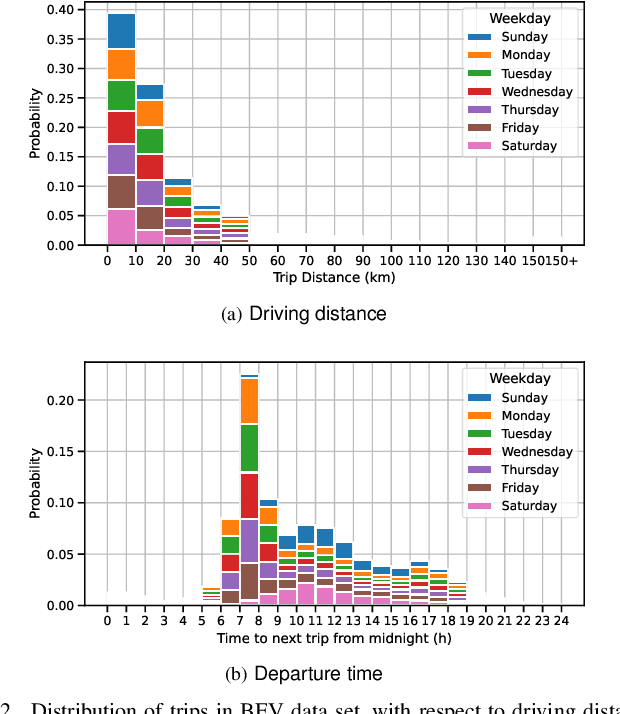
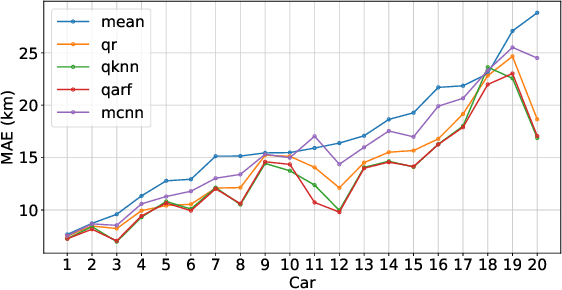
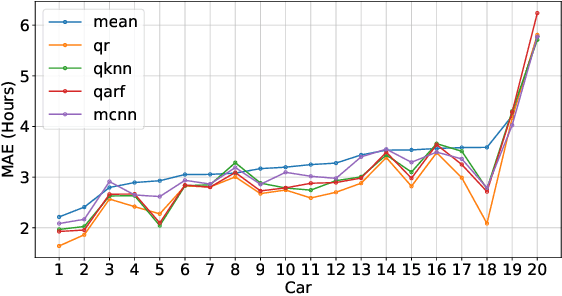
Abstract:Today, there is an ongoing transition to more sustainable transportation, and an essential part of this transition is the switch from combustion engine vehicles to battery electric vehicles (BEVs). BEVs have many advantages from a sustainability perspective, but issues such as limited driving range and long recharge times slow down the transition from combustion engines. One way to mitigate these issues is by performing battery thermal preconditioning, which increases the energy efficiency of the battery. However, to optimally perform battery thermal preconditioning, the vehicle usage pattern needs to be known, i.e., how and when the vehicle will be used. This study attempts to predict the departure time and distance of the first drive each day using different online machine learning models. The online machine learning models are trained and evaluated on historical driving data collected from a fleet of BEVs during the COVID-19 pandemic. Additionally, the prediction models are extended to quantify the uncertainty of their predictions, which can be used as guidance to whether the prediction should be used or dismissed. We show that the best-performing prediction models yield an aggregated mean absolute error of 2.75 hours when predicting departure time and 13.37 km when predicting trip distance.
A Contextual Combinatorial Semi-Bandit Approach to Network Bottleneck Identification
Jun 16, 2022
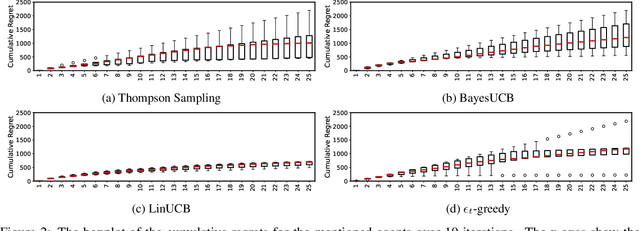
Abstract:Bottleneck identification is a challenging task in network analysis, especially when the network is not fully specified. To address this task, we develop a unified online learning framework based on combinatorial semi-bandits that performs bottleneck identification alongside learning the specifications of the underlying network. Within this framework, we adapt and investigate several combinatorial semi-bandit methods such as epsilon-greedy, LinUCB, BayesUCB, and Thompson Sampling. Our framework is able to employ contextual information in the form of contextual bandits. We evaluate our framework on the real-world application of road networks and demonstrate its effectiveness in different settings.
Passive and Active Learning of Driver Behavior from Electric Vehicles
Mar 04, 2022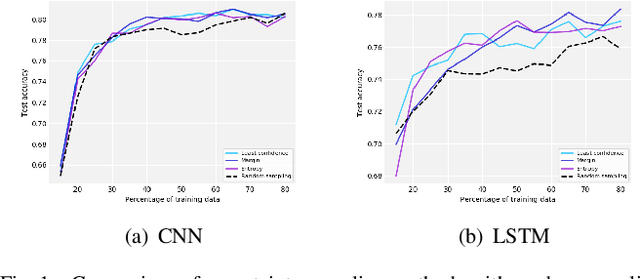
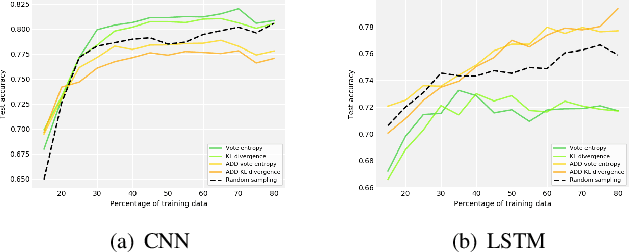
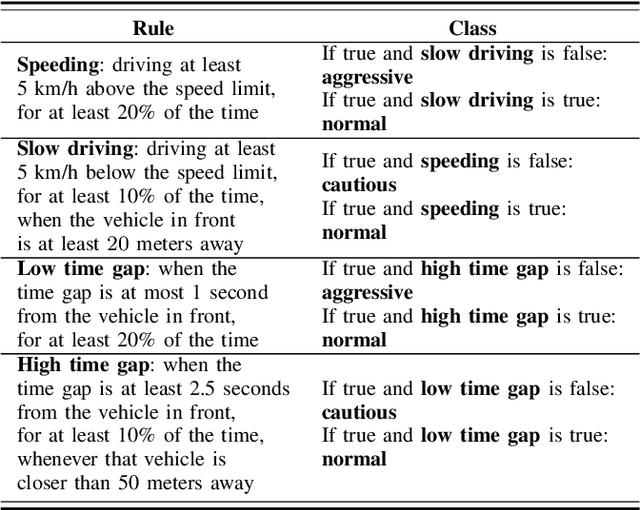
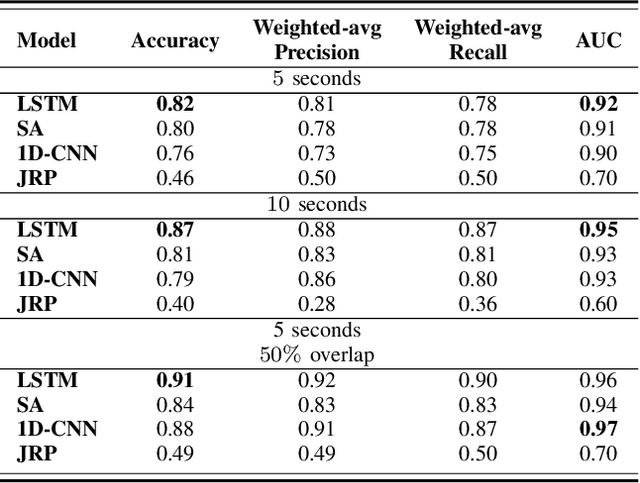
Abstract:Modeling driver behavior provides several advantages in the automotive industry, including prediction of electric vehicle energy consumption. Studies have shown that aggressive driving can consume up to 30% more energy than moderate driving, in certain driving scenarios. Machine learning methods are widely used for driver behavior classification, which, however, may yield some challenges such as sequence modeling on long time windows and lack of labeled data due to expensive annotation. To address the first challenge, passive learning of driver behavior, we investigate non-recurrent architectures such as self-attention models and convolutional neural networks with joint recurrence plots (JRP), and compare them with recurrent models. We find that self-attention models yield good performance, while JRP does not exhibit any significant improvement. However, with the window lengths of 5 and 10 seconds used in our study, none of the non-recurrent models outperform the recurrent models. To address the second challenge, we investigate several active learning methods with different informativeness measures. We evaluate uncertainty sampling, as well as more advanced methods, such as query by committee and active deep dropout. Our experiments demonstrate that some active sampling techniques can outperform random sampling, and therefore decrease the effort needed for annotation.
Online Learning of Energy Consumption for Navigation of Electric Vehicles
Nov 03, 2021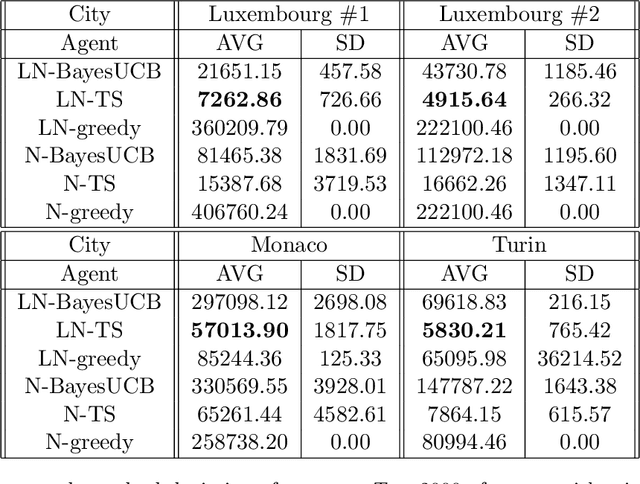
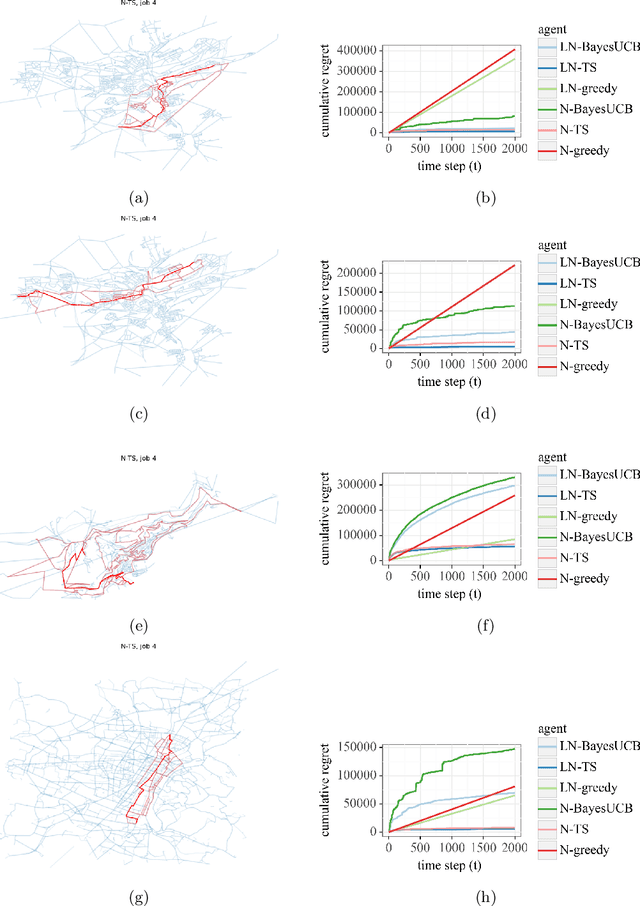
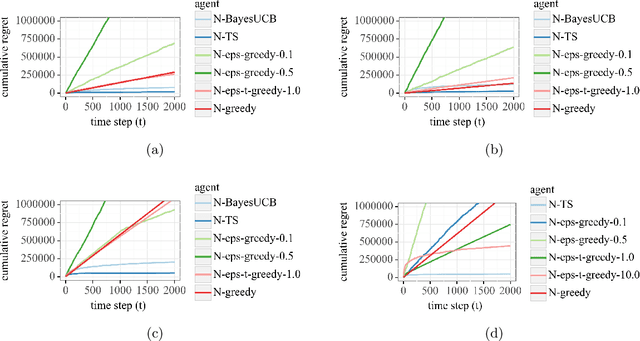
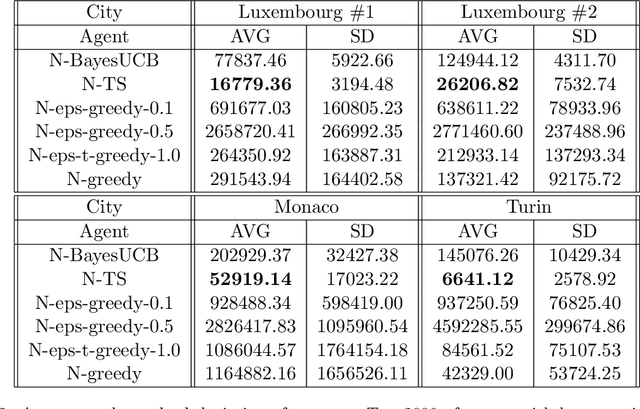
Abstract:Energy-efficient navigation constitutes an important challenge in electric vehicles, due to their limited battery capacity. We employ a Bayesian approach to model the energy consumption at road segments for efficient navigation. In order to learn the model parameters, we develop an online learning framework and investigate several exploration strategies such as Thompson Sampling and Upper Confidence Bound. We then extend our online learning framework to multi-agent setting, where multiple vehicles adaptively navigate and learn the parameters of the energy model. We analyze Thompson Sampling and establish rigorous regret bounds on its performance in the single-agent and multi-agent settings, through an analysis of the algorithm under batched feedback. Finally, we demonstrate the performance of our methods via experiments on several real-world city road networks.
Online Learning of Network Bottlenecks via Minimax Paths
Sep 17, 2021
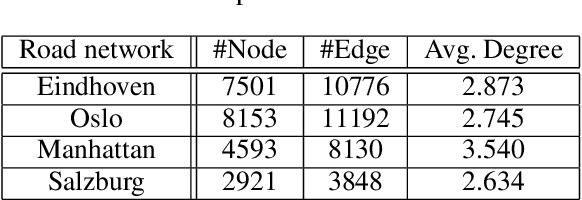

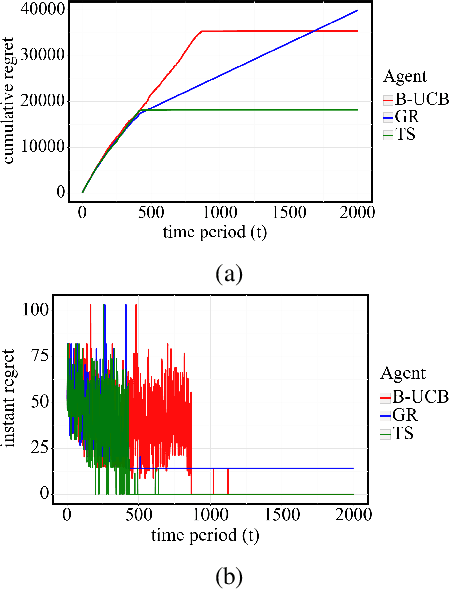
Abstract:In this paper, we study bottleneck identification in networks via extracting minimax paths. Many real-world networks have stochastic weights for which full knowledge is not available in advance. Therefore, we model this task as a combinatorial semi-bandit problem to which we apply a combinatorial version of Thompson Sampling and establish an upper bound on the corresponding Bayesian regret. Due to the computational intractability of the problem, we then devise an alternative problem formulation which approximates the original objective. Finally, we experimentally evaluate the performance of Thompson Sampling with the approximate formulation on real-world directed and undirected networks.
An Online Learning Framework for Energy-Efficient Navigation of Electric Vehicles
Mar 03, 2020

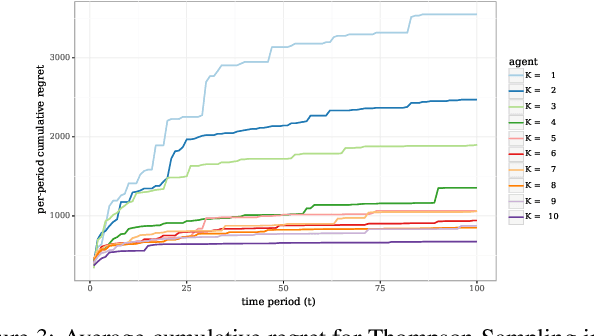
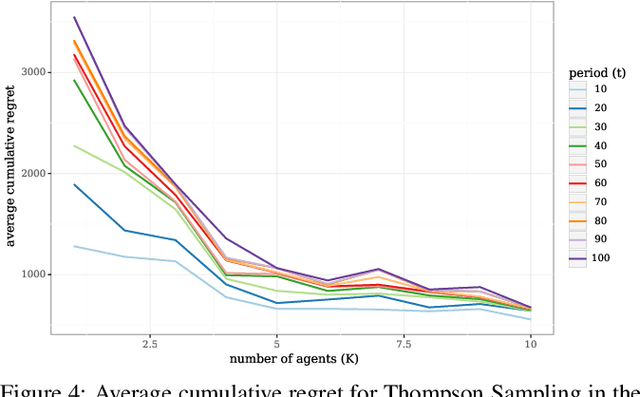
Abstract:Energy-efficient navigation constitutes an important challenge in electric vehicles, due to their limited battery capacity. We employ a Bayesian approach to model energy consumption at road-segments for efficient navigation. In order to learn the model parameters, we develop an online learning framework and investigate several exploration strategies such as Thompson Sampling and Upper Confidence Bound. We then extend our online learning framework to multi-agent setting, where multiple vehicles adaptively navigate and learn the parameters of the energy model. We analyze Thompson Sampling and establish rigorous regret bounds on its performance. Finally, we demonstrate the performance of our methods via several real-world experiments on Luxembourg SUMO Traffic dataset.
 Add to Chrome
Add to Chrome Add to Firefox
Add to Firefox Add to Edge
Add to Edge